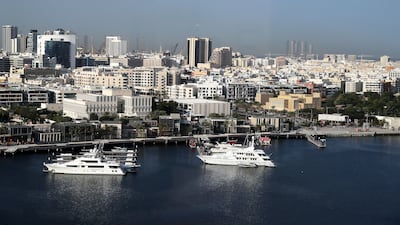Public joint stock companies and private companies in the UAE can begin registering for corporate tax from May 15, before it becomes applicable next month.
The corporate tax will be applicable for financial years starting on or after June 1, 2023.
Companies can register through the EmaraTax digital tax services platform, the Federal Tax Authority said on Sunday.
The FTA invited all taxable persons that are public joint stock companies and private entities resident in the UAE for corporate tax purposes to register, noting that this will not cover free zone persons ― for whom registration will be made available at a later stage.
“Early corporate tax registration will allow ample time for companies and businesses to comply with their legal obligations,” the FTA said.
“For the time being, the registration process will be available to individual legal entities only.”
Registration for other categories of taxable persons, such as natural persons conducting business or business activity yet to be specified by a Cabinet decision, will open at a later date, according to the regulator.
Taxable persons must register and obtain a tax registration number for corporate tax purposes, it said.
In January last year, the UAE introduced the federal corporate tax with a standard statutory rate of 9 per cent.
It brought the income of companies exceeding Dh375,000 ($102,000) within the taxable bracket.
Taxable profits below that threshold will be subject to a 0 per cent rate.
No corporate tax will apply on salaries or other personal income from employment — be it in the government, semi-governmental entities or the private sector, the Ministry of Finance said.
A “non-resident” company will not be required to register for corporate tax if it earns UAE-sourced income but does not have a “permanent establishment in the country”, the ministry said last month.
It added that government and government-controlled organisations as well as extractive businesses and non-extractive natural resource businesses that meet the set conditions are not required to register under the tax law.
Other exemptions are available to organisations such as pension or investment funds and public benefit organisations.
Small businesses in the UAE with revenue of Dh3 million ($816,880) or less can also benefit from a new corporate tax relief programme.
Public benefit organisations that contribute to the welfare of society will be eligible for exemptions. These include entities that focus on activities such as philanthropy, community services and corporate social responsibility.
Entities that intend to form a corporate tax group are required to register individually first, and then, at a later date, they will be able to apply to form a corporate tax group, the FTA said on Sunday.
An e-service card on corporate tax registration is available on the FTA website.
The standard statutory corporate tax rate of 9 per cent positions the UAE competitively when compared with other financial centres and developed economies.
The average top corporate tax rate among the EU countries is 21.3 per cent, while the figure stands at 23.04 per cent among OECD countries, and 26.7 per cent in the G7, according to the Tax Foundation in Washington DC.
Corporate tax rates have declined over the past 40 years, with the worldwide average falling from more than 40 per cent to between 25 and 30 per cent, Tax Foundation data indicates.
The UAE plans to keep the rate of corporate tax unchanged for the foreseeable future, Younis Al Khouri, undersecretary of the Ministry of Finance, told The National in January.
“The rate is agreed and fixed at 9 per cent … as long as the [corporate tax] law is there,” said Mr Al Khouri.
“If there is any review, we will announce it later but as of today, no change in the rate.”
The UAE's corporate tax regime is based on a self-assessment principle, which means businesses are required to ensure that the documents submitted to the FTA are correct and comply with the law.


